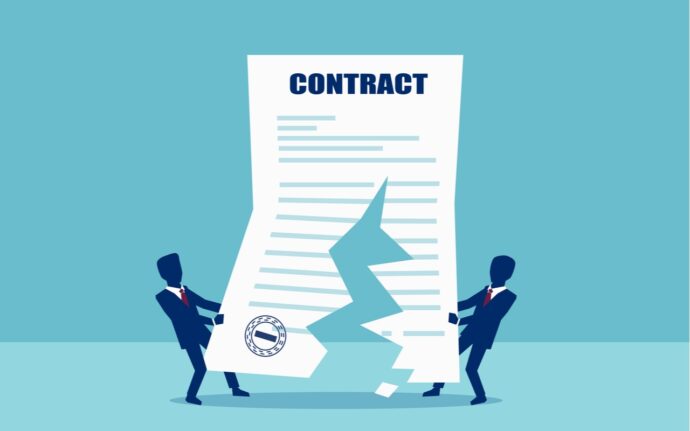Employment contracts serve as the bedrock of professional relationships, delineating the expectations and obligations of both employers and employees. These legally binding documents are crafted to ensure clarity and mutual understanding.
However, when breaches occur, they can disrupt this harmony, leading to potential legal battles and strained relationships.
This guide delves deep into the intricacies of employment contract breaches, offering insights and actionable advice for both parties involved.
Understanding the Employment Contract
An employment contract is a formal agreement that outlines the terms and conditions of employment. It encompasses key components such as job roles, responsibilities, compensation, benefits, and the duration of employment.
These contracts can vary in nature, from permanent positions and temporary roles to fixed-term assignments. Each type has its unique set of stipulations, tailored to the specific nature of the job.
For instance, a fixed-term contract might specify the project’s duration, while a permanent contract might focus more on long-term benefits and growth prospects.
Types of Breaches

Breaches in employment contracts can range from minor oversights to significant violations. Material breaches, for instance, are major violations that can fundamentally alter the contract’s essence.
Examples include failing to fulfill primary job duties or violating non-compete clauses. On the other hand, minor breach of employment contractmight involve partial violations, such as minor delays in task completion.
Unauthorized disclosure of confidential information, irrespective of intent, can also be deemed a breach, emphasizing the need for vigilance and adherence to contract stipulations.
Common Causes of Breaches
Several factors can lead to a breach of employment contract. Misunderstandings or ambiguities in contract terms often arise when the language used is not explicit or when both parties have different interpretations of the clauses.
Additionally, as businesses evolve, job roles might change, and if these aren’t reflected in corresponding contract amendments, it can lead to disputes.
Disagreements over compensation, especially in performance-based roles, or instances of unethical behavior, such as misrepresentation of skills, can also result in breaches.
Furthermore, unpredictable external factors, like market downturns, economic recessions, or organizational restructuring, can inadvertently lead to contract violations.
These scenarios underscore the dynamic nature of professional relationships and the need for flexibility and open communication.
Legal Implications of Breaches
Breaching an employment contract can have severe legal repercussions, often extending beyond immediate contractual obligations. For employers, consequences might include facing lawsuits, which can be both financially and reputationally damaging.
They might also be liable for paying damages to the aggrieved party or even face public relations crises that tarnish their brand image.
Employees, conversely, might face job termination, legal actions that can be costly, or irreparable damage to their professional reputation, making future employment challenging.
The legal landscape offers various remedies for such breaches, ranging from monetary damages and specific performance demands to the more drastic measure of contract termination.
Prevention and Mitigation Strategies

The adage “prevention is always better than cure” holds particularly true for employment contracts. Proactive measures, such as clear communication between parties, can prevent many potential breaches.
Drafting contracts meticulously, ensuring all clauses are unambiguous, and conducting periodic reviews to ensure the contract remains relevant are essential strategies.
Training sessions can also be organized to ensure all parties fully understand their roles and responsibilities. If, however, disputes do arise, resolution methods like negotiation, mediation, or arbitration can offer amicable solutions.
These methods often preserve the professional relationship’s sanctity, ensuring that minor disagreements don’t escalate into major conflicts.
Remedies for Breach of Contract
When breaches occur, the aggrieved party isn’t left without recourse. They can seek various remedies, tailored to the nature and severity of the breach. Damages, or compensation for losses, are the most common remedy.
In some cases, injunctive relief might be sought to prevent further breaches, especially if there’s a risk of ongoing harm. Specific performance, where the defaulting party is ordered to fulfill the contract’s terms, is another option.
Real-world examples are plentiful, from employees successfully suing for wrongful termination due to biased reasons to companies seeking damages for breach of confidentiality when an employee shares trade secrets.
Employer’s Responsibilities
Employers have a significant responsibility in upholding their end of the employment contract. This encompasses providing a safe working environment, free from hazards and discrimination.
They must also ensure fair compensation, which aligns with the market standards and the employee’s role and responsibilities. Adhering to labor laws, both local and international, is non-negotiable.
Any lapses in these areas can not only lead to breaches but also severely damage the organization’s reputation, trustworthiness, and overall employee morale, leading to a higher turnover rate and decreased productivity.
Employee’s Responsibilities

On the flip side, employees have their set of responsibilities and duties.
These include performing tasks diligently and to the best of their abilities, respecting the confidentiality of sensitive company information, and adhering to company policies and guidelines. Regular training and adherence to ethical standards are crucial.
Deviations from these responsibilities, whether intentional or due to negligence, can lead to disciplinary actions, ranging from warnings to legal repercussions, depending on the severity of the breach.
Seeking Legal Advice
In situations where potential breaches are suspected or have occurred, seeking legal counsel is paramount.
Experienced legal professionals can offer invaluable insights, assess the situation’s gravity, and provide guidance on the best course of action.
They can help interpret complex contract clauses, advice on rights and obligations, and suggest the best path forward.
Whether it’s through mediation, arbitration, or legal proceedings, having an expert by your side can make a world of difference, ensuring that rights are protected and justice is served.
Case Studies
Real-life case studies provide invaluable insights into the complexities of employment contract breaches.
Consider a tech employee who, after moving to a rival company, inadvertently uses proprietary algorithms from their previous employer. Such actions can lead to significant legal battles, with claims of intellectual property theft.
Similarly, companies that fail to compensate as per contract stipulations, perhaps due to financial constraints or oversight, can face lawsuits from aggrieved employees.
Analyzing these case studies, showcasing both employer and employee perspectives, offers invaluable lessons on navigating the intricate world of employment contracts, emphasizing the need for clarity, understanding, and mutual respect.
Conclusion and Takeaways

Employment contract breaches, while challenging, are not insurmountable. With clear communication, mutual understanding, and proactive measures, most breaches can be prevented.
For those embroiled in disputes, seeking legal advice and opting for amicable resolution methods can pave the way for positive outcomes.
As we navigate the professional landscape, let’s prioritize understanding, empathy, and mutual respect.















